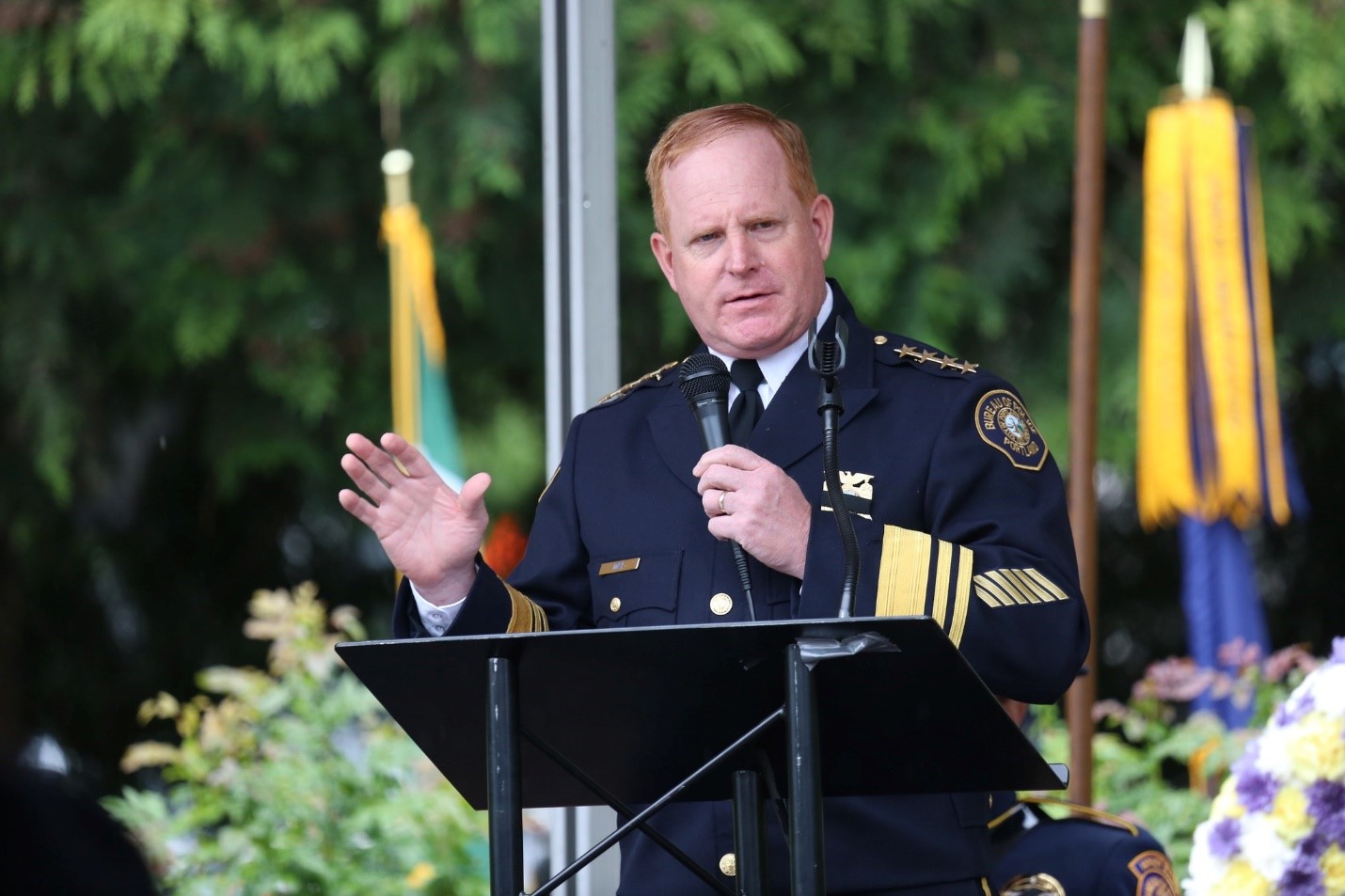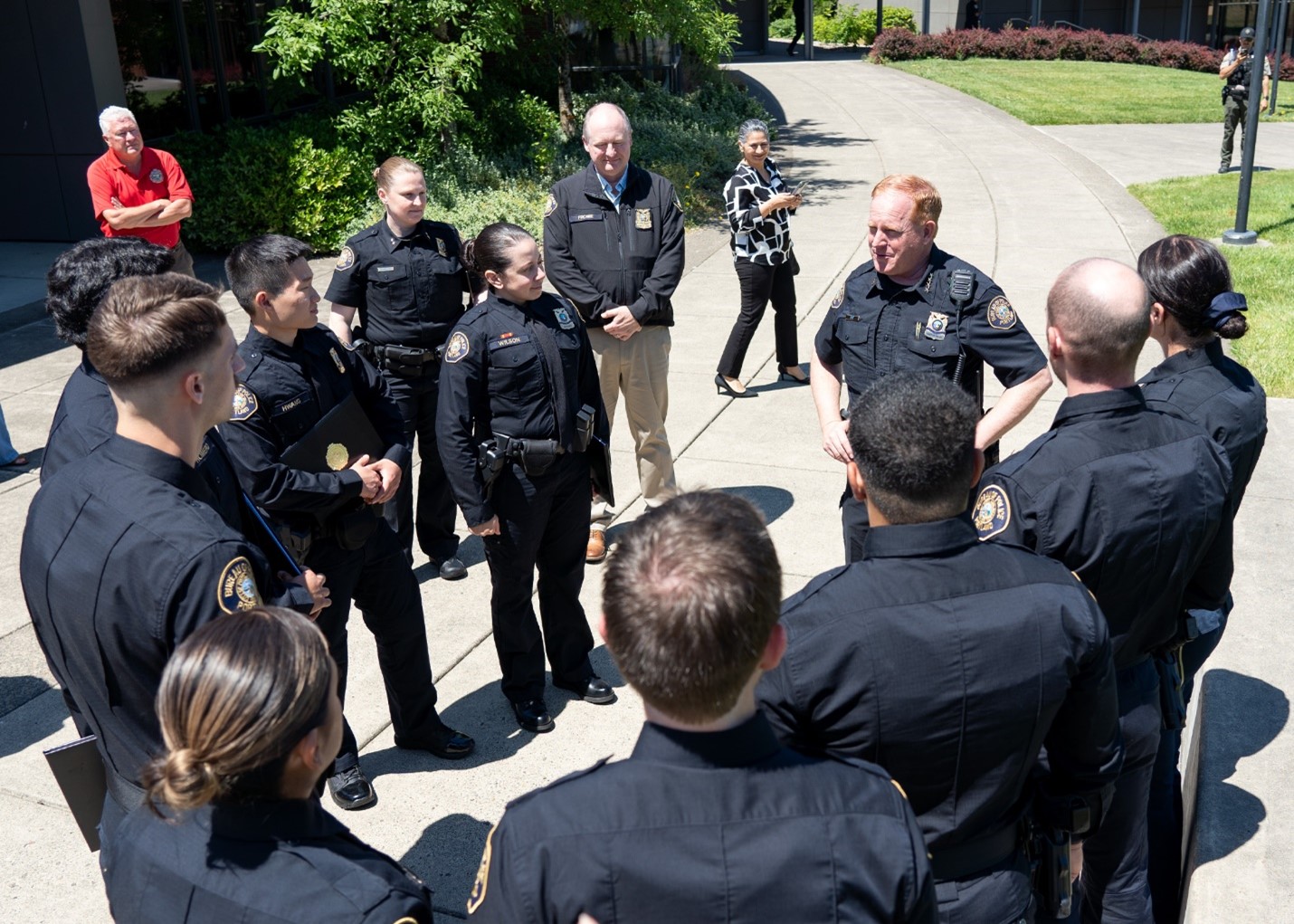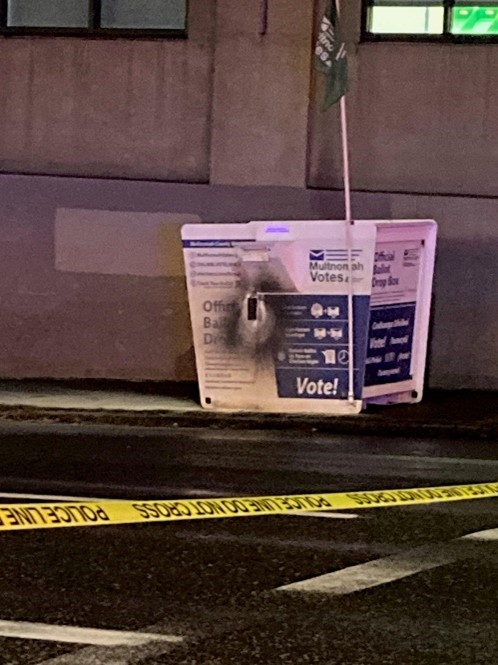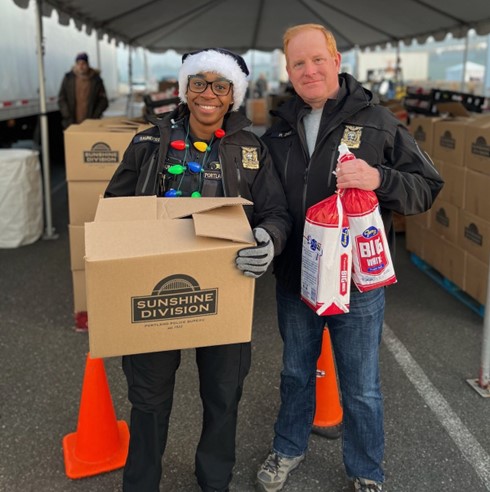|
November 2, 2024 Portland Chief Bob Day on drug laws, homelessness, the 2020 demonstrations and riots, and staying hopeful
PERF members, For this week’s column, I spoke with Chief Bob Day of the Portland, Oregon Police Bureau (PPB) about his life and career, recent changes to drug and homelessness laws, and the months of daily demonstrations and rioting in Portland in 2020. We spoke on Tuesday, one day after someone set ballot boxes on fire in Portland and neighboring Vancouver, Washington. Chief Day joined the Oregon State Police in 1988, then moved to the Portland Police Bureau in 1990. He rose through the ranks to become deputy chief in 2018, then initially retired in 2019. In 2023, he returned to PPB as its police chief.
Chief Day speaking at PPB’s annual police memorial ceremony in May. Source: Portland Police Bureau on Facebook Chuck Wexler: Did you grow up in Portland? Did you always want to be a police officer? Chief Bob Day: Portland is home for me. When I graduated from high school, I wasn’t sure what I wanted to do. My mom really thought I should be a pastor and encouraged me to go to a local Bible college. One day a police chaplain came to speak about police work, and I thought that sounded a lot better than being a pastor. So the next year, I enrolled in the local community college, then was accepted in the Oregon State Police cadet program and never looked back. I love the profession. I think it’s the most honorable profession in the country, and it was a great fit for me. I was with the state police as a cadet, then full time. But I wanted to come back to the Portland area, so I applied to work for the City of Portland. Wexler: You initially retired from the agency in 2019 and started a speaking and consulting organization called “Reluctant Change.” Tell me about that. Chief Day: I retired in 2019 and wasn’t sure what I was going to do. I thought I would get back into police work, but that didn’t materialize. About six months into my retirement, my wife told me our marriage did better when I was working. In 2020, I was brought into Portland Mayor Ted Wheeler’s office to do some consulting. Then the city went through more than 100 days of rioting, and I worked in the mayor’s office advising appropriate responses. A lot of my recommendations were not adopted, and at the end of the year, I decided to step away. As many people have said, the two things cops hate are the way things are and change. And few people are more scripted and consistent than I am. But that’s not realistic in this profession or in life, because change is constant. I began to do consulting work and speeches and presentations about change management. One of the most significant changes in my life was the loss of our son to cancer in 2016. He was diagnosed in 2010 at the age of nine and passed away on August 27, 2016. I was with the Bureau advancing my career while he and the rest of our family fought to live well and put him in the best position to survive. Loss is universal, whether it’s the loss of a child, spouse, divorce, job loss, or bankruptcy. I know many have similar tragedies, but going through that changed how I wanted to be, not only as a police leader, but also as a father, husband, and person of faith. So before I came back to the Bureau, I was traveling the country, working with leaders on change management based on my police experience and life experience. Wexler: I’m so sorry to hear about your son. Can you talk a little more about what the summer of 2020 was like in Portland? Chief Day: There were continuous demonstrations and riots every day and every night. I think there was a week in September 2020 when they stopped because we had wildfires in the state and there was smoke, but otherwise it was night after night after night. The challenge was not only the intensity of it, but also that the protests were about the police. It was not consistent messaging to have to tell our members to go out and deal with something that everybody was supposedly really mad about them being a part of. It took us a long time to figure out a way to make arrests in a more surgical and methodical way and separate the troublemakers from the rest of the public. Eventually we got there, and over time the city began to open up again. We had federal officers who came in and caused a great deal of confusion and consternation. Everybody pulled back, and PPB was isolated. The state police stood alongside us, but nobody else wanted to have anything to do with the Portland Police Bureau. It was a time of isolation for PPB, and we’re still managing the trauma and fallout from that. Wexler: What was your approach to managing that when you came back as police chief in 2023? Chief Day: Since 2020, we’ve hired about 200 officers, and we’ve lost close to 300. We have a number of officers who were hired in 2020 or 2021 and didn’t really get a traditional training module because they were constantly deployed to these significant events. So we have officers who have completed their probation but maybe have never taken a burglary call or done other things because they were always managing the crisis of the day. We also have officers who were hired after 2021 and don’t have a frame of reference for what everyone else went through. I have an 800-person department, and maybe 20-25 percent don’t have that frame of reference.
Chief Day addressing police academy graduates in June. Source: Chief Bob Day on X Like many agencies, we saw a massive exodus of our senior-level people, and we lost a lot of experience. Someone might have been a lieutenant for six months, a captain for six months, and then a commander or assistant chief. And 18 months earlier, they had been a sergeant or a brand-new lieutenant. That’s not a criticism of them, but it’s lost experience. I stepped into an organization that I loved and had been familiar with for almost 30 years. But I had been gone for four-and-a-half years, and I had to recognize that it was different than when I left. I also had to recognize that, though I had been in the mayor’s office and in the community, I hadn’t been on the line every day in 2020 and 2021 experiencing what they experienced. I told the Bureau that I knew I hadn’t been there, and I needed to know what it was like and what I didn’t know. I wanted to be available to hear that. But I also told them there were things I knew that they didn’t. By being outside of law enforcement during those difficult years, I had opportunities to sit down with activists, critics, and others who I probably never would have met with if I had still been on the job. So I had relationships and awareness that they didn’t have, and I wanted them to be open to the idea that there may be things I could bring to the table as well. So over the past year, I’ve tried to develop a high level of sensitivity and empathy to their needs, but also recognize that the world has moved on. It’s 2024, going into 2025, and very few people in the private sector and community are still talking about 2020. Yet within the Police Bureau, it’s still top of mind, and understandably so. Wexler: And you give officers an hour off a day for wellness, right? Chief Day: A couple years ago we established a wellness program, but we didn’t have any structure around it. So we dedicated some resources and our members, who are on four 10-hour shifts, get an hour every day to participate in a wellness activity. It might be yoga, it might be a walk, it might be a run, or they might take a nap. Now, this can be canceled at any time. We’ve canceled all days off for the election next week, and we’ll probably be limiting our wellness time. But it’s a benefit for our members and an opportunity for them to care for themselves. We’ve also contracted with a couple of police psychologists who are not full time but are available eight to 10 hours a week. Members can simply click on a link and sign up, and it’s all confidential. During times the police psychologists’ schedules aren’t filled, they’re going to roll calls or just generally engaging with our members. This is a work in progress. Our wellness program previously lacked some structure. We need wellness, but we also need to have some accountability and guardrails on it, because I want to be able to demonstrate the return on the investment to the community. At four hours a week and 52 weeks a year, that’s 208 hours of paid time per year. So it’s a significant commitment by the Porland Police Bureau and City of Portland. And I support that, but I hope over the next year we’ll have the data to show things like a reduction in complaints and officer injuries. Wexler: Oregon passed a drug decriminalization measure in 2020 that was recently rolled back. Can you talk about that issue? Chief Day: In 2020, the voters approved a ballot measure that decriminalized the personal use of drugs – cocaine, heroin, fentanyl, whatever it may be. In the past, someone would have a syringe with heroin in it and go to jail for a felony. That became a citation we would issue people with a number they could call if they wanted to get help. The idea was that money saved on prosecution would be put back into services to help people with addiction. But there were a lot of things people didn’t anticipate. The biggest was fentanyl, which came on the scene around that same time. Fentanyl is one of the most addictive and deadly drugs we’ve seen. We started seeing an unprecedented number of deaths associated with fentanyl usage – 150 in 2022 and over 300 in 2023. And these are just the ones reported to us for investigative purposes, and don’t encompass all overdose deaths. People were dying on the street in droves. And that was associated with a lot of crime, because people commit crimes to feed their addictions. So the community stepped up, put pressure on the legislature, and in February the legislature changed the law. As of September 1, it’s now a misdemeanor to have low-level amounts, so it’s not back to being a felony. And we are encouraged to participate in our county deflection programs, which means that, in lieu of arrest, people can meet with a behavioral health specialist and be connected to services. If they stay engaged with services, they won’t be charged. If they drop out of the program and we arrest them again, they’ll be charged and go through the criminal justice system. We’ve been trying that out for about seven weeks now, so we don’t have a lot of information about how effective or successful it will be. Officers always have the discretion to take people to jail, and the criteria to qualify for deflection is very, very narrow. Most of the time people have warrants or other charges or have an amount of drugs that exceeds personal use, so they’re not eligible for deflection. Wexler: The Supreme Court just ruled that municipalities can ban people from sleeping and camping in public places in a case that originated from a city in your state, Grants Pass. How has that changed Portland’s response to homelessness? Chief Day: This past year Mayor Wheeler took the lead and we’ve begun enforcing time/place/manner restrictions. We have a process in place where we do extensive outreach and provide plenty of warning, but for people who refuse to adjust their behavior and participate in shelters or other services, we arrest them for the city ordinance violation of camping. That’s a massive shift in ideology from the last several years. It's not as if officers are just driving around and stopping wherever they want. It’s an orchestrated effort and is allowing us to hold people accountable and increase service opportunities. We’re doing this in conjunction with numerous partners, including county officials and nonprofits. One challenge we face in Oregon is that in 2021 the legislature passed a state law that basically requires us to abide by the provisions of the original Grants Pass ruling. So we still need to have shelter space and an entire support system. Wexler: Yesterday (Monday) someone set fire to ballot boxes in Portland and nearby Vancouver, Washington. What can you tell me about that incident, and what are your other concerns about the upcoming election? Chief Day: I was just at the MCCA, PERF, and IACP meetings last weekend, and I heard a lot of great conversation about election issues. This is really an effort to cause us to question the legitimacy of our foundational processes. If someone can destroy a ballot box, then people might begin to question the legitimacy of the election and whether or not their vote was counted. That begins to chip away at the trust and legitimacy of our entire democracy. When I came back from those meetings last week, I told my elected officials that I was more concerned about an attack on an election facility or ballot box than public order issues, so I wasn’t surprised by yesterday’s events. The damaged ballot box in Portland. Source: Portland Police Bureau We have some good leads and have erred on the side of transparency when sharing information with the community. I think it’s important to show the community that we’re on this. We had a press conference with the county elections officials, city and county leaders, and our assistant chief who’s overseeing the investigation to assure folks that we’re unified in our commitment to a fair and equitable election. There’s tension and intensity right now in our country and our region that we need to be aware of. I think law enforcement has a responsibility to step into this pace and provide pragmatic, carefully worded messaging. I think people are looking to us for calm and confidence in a way they historically have not. Wexler: You sound optimistic. Are you? Chief Day: I like to say that I’m hopeful, not optimistic. To me, optimistic people kind of sit around and figure it’ll get better. Hope requires action. This is a philosophy and value we really developed when my son Sam was sick. If we wanted to fight for Sam, we had to go out and be proactive. We sought treatment all around the country and doctors would tell us how poor Sam’s chances of survival were. We’d stop them and say, “We’re not asking you to heal our son; we’re just asking you to be hopeful.” And we believed that any day with hope, even though we knew the circumstances were hard, was better than any day without hope. I know what I’ve stepped into and the challenges we face as a city, but I am hopeful. We are moving toward some goals and are seeing results. Portlanders are responding and want a relationship with their police department. I recently announced an effort to try to increase our staffing by more than 200 in the coming years, and I have across-the-board support for that from the community. I am hopeful for the city and the Police Bureau, and I’m going to be passionate in my advocacy and my work toward those goals.
Chief Day and a Portland officer in December 2023. Source: Chief Bob Day on X Thanks to Chief Day for speaking with me and sharing his perspective with our members. And thank you all in advance for voting and protecting our democracy on Tuesday! Best, Chuck |




